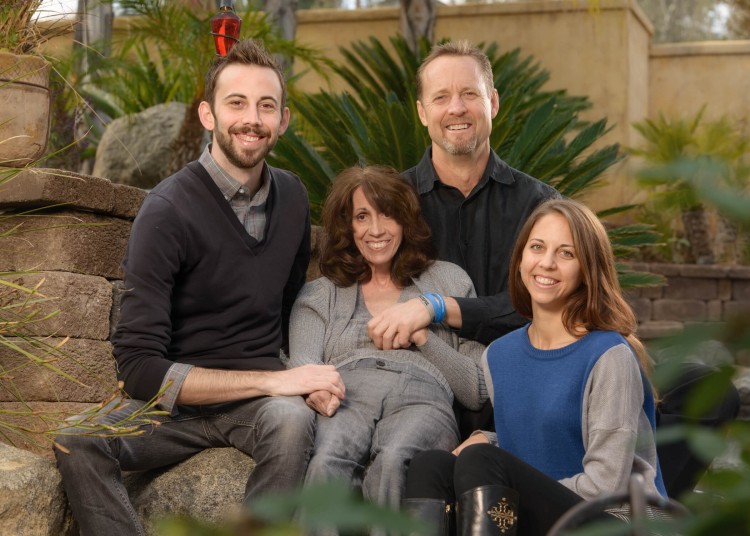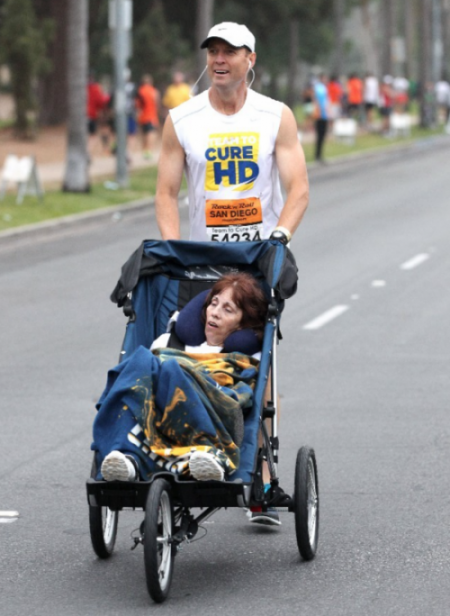
I have often gone to the San Diego Chargers Director of Public Relations Bill Johnston to get the scoop on NFL players or develop a story idea. Thirty-six years in the NFL has given Bill a deep vault of stories to draw upon, but the one that moved me most isn’t a football story, even though it reads much like a tragic sports tale about a man who was blindsided and got up because his team needed him.
A big part of Bill’s job publicizing the team is to help the media. I went to Bill the day Marty Schottenheimer was abruptly fired in 2007 to facilitate an interview with the former head coach.
When it was reported that the Chargers might trade Phillip Rivers this past April, it was Bill who gave me the company counterpoint. He was there in 1979 when Head Coach Don Coryell and Quarterback Dan Fouts began implementing one of the NFL’s most prolific passing offenses of all time and tucked away his own grief in 2012 to help make sense of linebacker Junior Seau’s suicide. Still, the most powerful story I’ve heard him tell is his own.
It was some 16 years ago that Bill Johnston had truly found his happy place. He and his wife had just finished building their dream home and were looking forward to raising their son and daughter in a great neighborhood surrounded by friends.
“I remember it like it was yesterday,” Bill says, shaking his head in disbelief at how badly he had been fooled. “I was standing outside and I was like, I’ve got everything I want.”
The way it happened kind of makes you wonder if God was having a really bad day and took it out on Bill without knowing the ramifications of his single sweep kick. There’s no other good explanation for why a humble, hard working and well-liked man could have his legs taken out from under him so profoundly.
It was 1999. Bill’s wife, Ramona Johnston, began feeling like something wasn’t right with her health. She was only 39 years old, but she and Bill were noticing physical changes in the way she talked and walked. At first, Ramona thought it might be a brain tumor. She had a number of small car accidents, was having trouble thinking clearly and articulating her thoughts and had constant headaches.
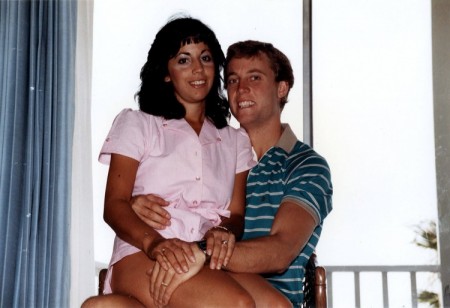
“Things that used to come easy for her, she just couldn’t figure out anymore,” Bill remembers. After six months of visiting different doctors in search of a diagnosis, someone speculated it could be Huntington’s disease. A blood test confirmed it was.
Huntington’s disease is a particularly cruel diagnosis. It is a progressive and debilitating brain disorder characterized by the uncontrolled movements it causes many of its victims. Similar to more publicized diseases like ALS, it affects muscle coordination, eventually leaving individuals unable to talk, walk or even swallow. But unlike ALS, HD is inherited. It’s passed on from parents to their children. Ramona is one of the rare 1 to 3 percent of people afflicted with the disease despite having no family history of it. That wasn’t what she was thinking about, though, when she was first diagnosed; instead she was panicked about the future of her own two children, Hayley and Jared, who were 11 and 14 years old at the time.
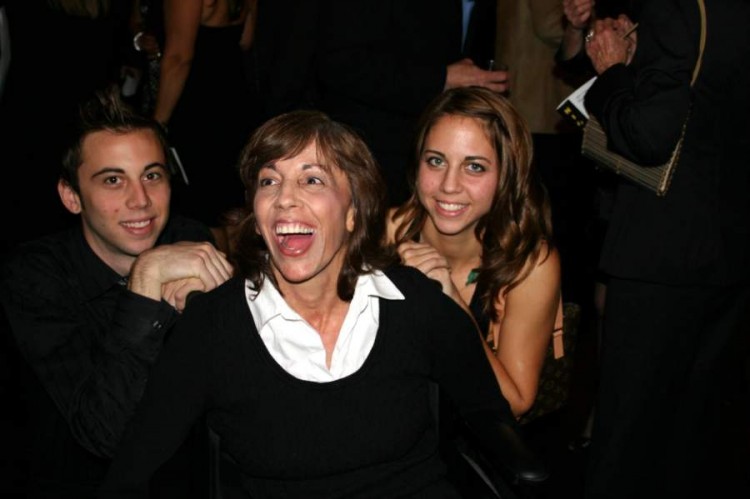
Kids who have a parent with HD have a 50 percent chance of carrying the gene. If they don’t inherit it, they won’t get the disease. If they do, there is no escaping it. They will develop Huntington’s disease, likely in their late 30s or early 40s, and there is no cure.
Bill was the only one in his family who was safe, which gave him more guilt than peace. The three people he loved most might all be afflicted by the same horrific disease. “I was going the wrong way. I didn’t know which way was up,” he says, looking back on his reaction to Ramona’s diagnosis. “I remember sitting at my desk one day and I couldn’t do anything. I was numb. I was frozen. I was stuck.”
He picked up the phone and made an emotional call to former Chargers player Miles McPherson, who was now the pastor of The Rock Church in San Diego, and asked for help. In one conversation McPherson made Bill realize he couldn’t change the hand God had dealt him or his family. He couldn’t magically make Huntington’s go away. He could do something though. “I couldn’t cure this disease or end it, but I could raise money, I could tell people about it and give it to people that could,” he says.
Three years earlier in 1998, Bill had run the inaugural San Diego Rock ‘n Roll marathon to cross off an item on his bucket list. He decided to do it again. This time though, he would ask people to donate money for each mile he ran. His employers, Chargers owners Dean and Susie Spanos, matched every dollar he brought in and when it was all said and done Bill had raised about $30,000. He decided from that moment on, he would do it every year.
On May 31, 2015 he ran his fifteenth marathon. His daughter Hayley ran her seventh. For the third straight year, Ramona was there too. They pushed her 26.2 miles in a stroller. The Johnston’s fundraising for the Huntington’s Disease Society of America has grown to include many other events like an annual 500-person gala every fall and this June, the 14th annual Shoot to Cure HD at Chargers Park. Bill has become an indirect face of a rare disease that doesn’t have a prominent spokesperson. It’s hard to know how 56-year-old Ramona feels about it all. She can no longer speak, wink or communicate in any way at all.
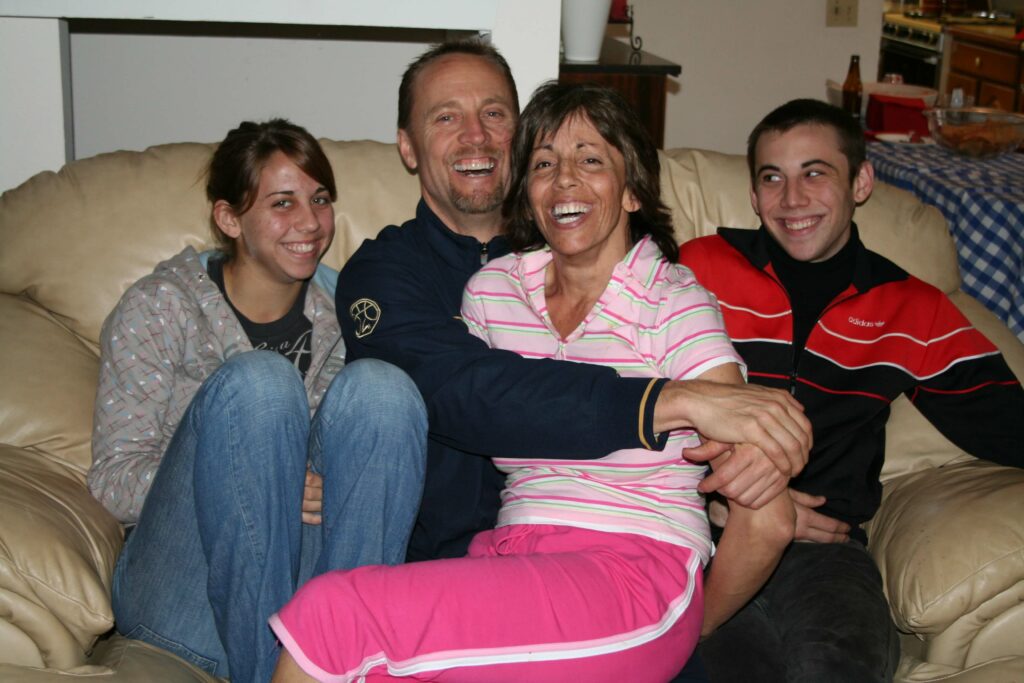
Eight years ago Bill moved her into a full-time skilled nursing facility where she lives with other HD patients and people with traumatic brain injuries. Bill sees her every day before he goes to work at the Chargers headquarters.
“I get there really early in the morning because she is best in the morning. Sleep seems to help her,” he says thoughtfully. “The nurses get her up and get her dressed. They have a nice TV they put her in front of.” Ramona spends her days sitting in a chair. She is fed through a tube. Her limbs do occasionally move and jerk, but not because Ramona tells them to, she has no muscle control at all.
“It’s hard to say if she understands what I’m saying,” Bill says, pondering the value of his morning routine. “I’m pretty sure there is more there than meets the eye. She can’t communicate and let me know that she knows what I’m saying, but sometimes I get a response from her that I say to myself, ‘ahh she understands.’”
It’s just like Bill to find the silver lining. One of his biggest blessings came back when his son Jared turned 18 and couldn’t take the unknown any longer. “I’m living like I have it anyways, I might as well know,” he told Bill when he explained to his dad why he was taking the blood test to find out if he had the HD gene. It was negative. For Bill, a death sentence for one of his children, lifted.
Twenty-six-year-old Hayley doesn’t want to know her fate. Yet. “She will someday,” says Bill. “Before she gets married or decides to have children, but not now. She’s a tough girl.”
It’s too hard for the Johnstons to think that Hayley could end up like Ramona. So they don’t. Instead they run. And, raise money like crazy. Because, while it’s likely too late to cure Ramona, it might not be too late for Hayley if she doesn’t end up beating the odds.
“As long as Haley is at risk, I’m doing what I can do to help her,” Bill says while his eyes fill with tears. “Sometimes I feel like I’m a poster child for this disease. There’s no one else that is going to tell people about it, so I’ve got to.” And that’s how a good PR guy puts a positive spin on a story that doesn’t really have one.
Click Here To Donate to Team Johnston: Support Bill and Hayley
